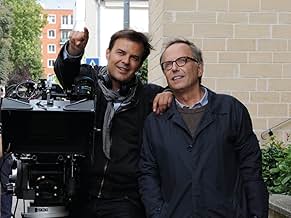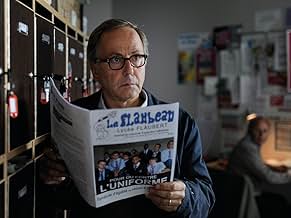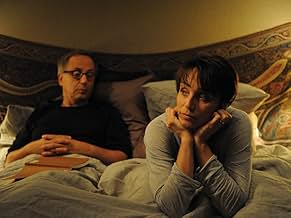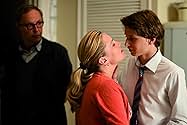Dans la maison
- 2012
- Tous publics
- 1h 45m
IMDb RATING
7.3/10
35K
YOUR RATING
A high school French teacher is drawn into a precocious student's increasingly transgressive story about his relationship with a friend's family.A high school French teacher is drawn into a precocious student's increasingly transgressive story about his relationship with a friend's family.A high school French teacher is drawn into a precocious student's increasingly transgressive story about his relationship with a friend's family.
- Director
- Writers
- Stars
- Awards
- 10 wins & 23 nominations total
Jana Bittnerová
- La doublure de la jumelle
- (as Jana Bittnerova)
- Director
- Writers
- All cast & crew
- Production, box office & more at IMDbPro
Featured reviews
Francois Ozon is the director of this provocative and unusual film that takes the viewer inside the minds of the characters. It is not a traditional movie with a beginning and an end but a study of a period in the lives of different people. In this movie, a high school student named Claude catches the attention of his teacher named Germain, through an essay that explores the family of another student, named Raffa. Claude has begun to tutor Raffa in mathematics. At first the teacher, as the student's mentor, is hesitant about the breach of privacy with this series of essays but succumbs to the the temptation to become a voyeur. Each essay ends with the notation...To Be Continued. Both student and teacher are seen as outsiders in their own worlds and are strangely attracted to the family. The student gently mocks the family he is observing as dull and middle class. The teacher can understand this estrangement from their world because Claude is from a different world and the teacher himself is something of an outsider in his own world. He encourages the boy to continue his writing because he feels the boy has potential as a writer. As the movie goes along, we see the family of Raffa behaving as many other families pursuing money and status. The boy and his father are both named Raffa so they become the Raffas (plural). The student has a romantic interest in the mother, who seems to be the real reason he wants to explore the home. The desire for sexual encounters is present throughout the movie and seems to come out in a few surprising and light hearted episodes. We also see how Raffa and Claude interact with their teacher and the other students and their own families. The wives of Germain the teacher and Raffa Sr. are also interesting with one a traditional woman handling the domestic lives of the two Raffas. Meanwhile, Germain's wife manages an art gallery for two wealthy sisters, who she is trying to keep happy by making the gallery profitable. The movie is an interesting view of modern angst with the pressures to conform competing with the desire to be independent and on occasion, straying from the accepted standards. All in all, it is a provocative look at the different lives of people who interact and occasionally come into conflict. At the end, we see the message: to be continued.
For his thirteenth feature film, French New Wave director Francois Ozon has outdone all acclaim given to his 2002 remake of "8 Women" with a mischievous and dysfunctional tale, of what can be perceived as
coming-of-age.
A black comedy conflated with so much grandeur from literary greats to post-modern poioumena, you cannot help but wave the white flag and just go along in service of jest and sheer curiosity.
Adapted from a brilliant play written by Juan Mayorgo, this film is a meta-narrative centered on Claude Garcia (Ernst Umhauer) -- a sixteen year old loner who intrudes upon the home life of fellow student Rapha Jr., and writes about it. What begins as a one-off weekend assignment for literature class, escalates with great passion and frequency when Claude's teacher, Germaine (Fabrice Luchini) detects flashes of talent and decides to groom the teenager.
Here, Ozon proposes a three-fold narrative weaving through the surface of three realities -- Germaine's growing obsession with Claude's story imitates the viewers' relationship with Ozon's film (and perhaps soap opera addiction), and Claude as a self-conscious narrator of the events occurring inside Rapha's house.
When the film begins, Claude is unhappy with a lonely life and clearly needs to distract himself with wholesome family warmth. Having witnessed Rapha's close relationship with parents Rapha Sr. and Esther at the school gate, strikes a friendship with the boy when semester begins. Establishing himself as a math tutor and study mate, Claude quickly wins their affection and trust. Thrilled by this opportunity to experience life with a sense of belonging, yet predisposed to primitive urge, Claude's desire swells into furtive yearning for Esther. And naturally, things get complicated.
As Germaine's involvement with Claude's writing departs from passive reader, to that of a story-telling coach superimposing rules of dramatic structure, it occurs to the viewer that he may very well be a shaping hand in the outcome of this voyeuristic experiment.
Of course, the fabrics of fiction and reality overlap but they do not confuse -- the satirical logic unfolds in ways that are thought- provoking, humorous and downright captivating.
cinemainterruptus.wordpress.com
A black comedy conflated with so much grandeur from literary greats to post-modern poioumena, you cannot help but wave the white flag and just go along in service of jest and sheer curiosity.
Adapted from a brilliant play written by Juan Mayorgo, this film is a meta-narrative centered on Claude Garcia (Ernst Umhauer) -- a sixteen year old loner who intrudes upon the home life of fellow student Rapha Jr., and writes about it. What begins as a one-off weekend assignment for literature class, escalates with great passion and frequency when Claude's teacher, Germaine (Fabrice Luchini) detects flashes of talent and decides to groom the teenager.
Here, Ozon proposes a three-fold narrative weaving through the surface of three realities -- Germaine's growing obsession with Claude's story imitates the viewers' relationship with Ozon's film (and perhaps soap opera addiction), and Claude as a self-conscious narrator of the events occurring inside Rapha's house.
When the film begins, Claude is unhappy with a lonely life and clearly needs to distract himself with wholesome family warmth. Having witnessed Rapha's close relationship with parents Rapha Sr. and Esther at the school gate, strikes a friendship with the boy when semester begins. Establishing himself as a math tutor and study mate, Claude quickly wins their affection and trust. Thrilled by this opportunity to experience life with a sense of belonging, yet predisposed to primitive urge, Claude's desire swells into furtive yearning for Esther. And naturally, things get complicated.
As Germaine's involvement with Claude's writing departs from passive reader, to that of a story-telling coach superimposing rules of dramatic structure, it occurs to the viewer that he may very well be a shaping hand in the outcome of this voyeuristic experiment.
Of course, the fabrics of fiction and reality overlap but they do not confuse -- the satirical logic unfolds in ways that are thought- provoking, humorous and downright captivating.
cinemainterruptus.wordpress.com
This is a very interesting film taking both the point of view of a sixteen year old school boy and that of a middle aged teacher, with you dear viewer, playing yet another role. Ah ha, so, what we start with is a perhaps knowingly voyeuristic homework task set by the bored literacy tutor. Then we have the youth delivering precisely the kind of inflammatory story that reignites the tutor's interest. It's a dangerous game they both play - almost as if the boy were repeating the tutor's own youth with his post hoc adult knowledge. The innocents in this tale are ignored - or rather, their real stories are overlooked by both boy writer and his tutor whilst they play their silly game. The tutor's wife sees through the whole charade but then even her story is corrupted by inclusion in the boy's story-making. You, the viewer, need to pick carefully through the evidence you are presented. Do you want the boy to succeed? Do you want to encourage the teacher? Shame on you! You've gone down a garden path you should never have entered! Brilliant!
When you say commercial movies like Looper are well written (because for their genre, they are), and then watch something like Dans la Maison (In The House), writing goes up to a new level. François Ozon, the director, had already impressed in 2003 with Swimming Pool, but In The House is probably his best film to date. It tells the story of a student that begins writing essays for his french teacher about one of his classmates' family, while he enters their house and makes himself a close friend. Into The House feels like reading a good mystery book while watching someone else interpret it, being that "someone else" your own self. In a very subtle way, Dans La Maison makes you addicted to its story, with a very traditional but poetic and beautiful directing, real life characters, and mesmerizing acting from Fabrice Luchini and Kristin Scott Thomas, bringing the mind of a 16 year old student to this amazing parallel reality. Visit the fading cam blog for more!
This awkward and witty film is based on the play The Boy in the Last Row by Juan Mayorga, i.e. the script emanates from a solid creation. The run of the events is smooth, but sometimes it is tricky to follow the line between truth and fantasy, including the ending scenes, and some deeds remained mystery to me. In spite of serious topics touched (e.g. alienation, growing pains, loneliness, generation gaps), there are several funny scenes, particularly gallery-related ones, and strong performances provide additional value to the film (Fabrice Luchini as Germain Germain, Ernst Umhauer (skilfully depicting an 16-year-old while being 22) as Claude Garcia, Kristin Scott Thomas (in fluent French) as Jeanne Germain, Emmanuelle Seigner as Esther Artole - in particular). Hopefully, no remake will be made, as the sound of French and supposition of Frenchmen are just appropriate for such a film.
Recommended to all those fond of films with twists and not afraid of subtitles.
Recommended to all those fond of films with twists and not afraid of subtitles.
Did you know
- TriviaErnst Umhauer said this about the character he plays in the movie: "He confuses his writing with reality and turns everything in his path upside-down. He has no distance, it takes him a long time to realize his words are stinging and can do damage. He's smart, but not very conscious of his responsibility".
- Goofs(at around 1h 35 mins) While Claude is walking through park, his hair is parted on different sides between shots.
- Quotes
Claude Garcia: But I love you.
Esther Artole: No. It's not me you love. It's an image. An image in your head.
- Crazy creditsThe opening credits are shown as if they were hand-written on graph paper.
- ConnectionsReferenced in La noche de...: La noche de... En la casa (2018)
- SoundtracksDynasty Tching Memories
Performed by Wang Shu Imperial Orchestra
®2002 FGL Productions S.A, © Editions FGL
Avec l'aimable autorisation de FGL Productions S.A
- How long is In the House?Powered by Alexa
Details
- Release date
- Country of origin
- Official sites
- Language
- Also known as
- En la casa
- Filming locations
- Production companies
- See more company credits at IMDbPro
Box office
- Gross US & Canada
- $389,757
- Opening weekend US & Canada
- $31,441
- Apr 21, 2013
- Gross worldwide
- $16,190,771
- Runtime
- 1h 45m(105 min)
- Color
- Sound mix
- Aspect ratio
- 1.85 : 1
Contribute to this page
Suggest an edit or add missing content





























